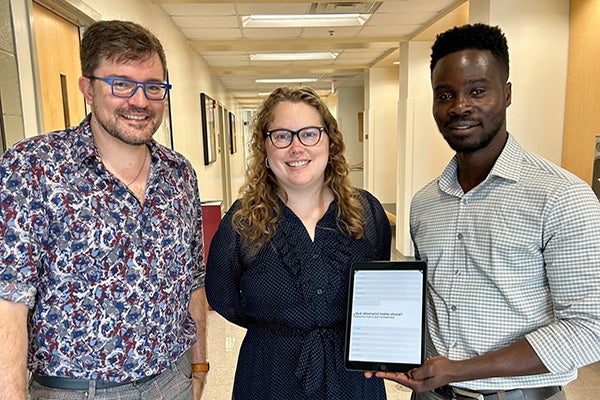ECU faculty guiding new inter-institutional research for equity initiatives

From left, Joseph Lee, Jamie Bloss and Leslie Cofie show an internet survey for farmworkers on an iPad. (Contributed photo)
East Carolina University faculty members Joseph Lee, Jamie Bloss and Leslie Cofie are building on past successes to serve on a new inter-institutional research team focused on advancing health equity by promoting digital inclusion for agricultural workers and their families in North Carolina.
The North Carolina Department of Health and Human Services’ Office of Rural Health, in partnership with ECU and North Carolina State University, secured a five-year, nearly $6 million Community Partnerships to Advance Science for Society award from the National Institutes of Health for the proposed Agricultural Workers Digital Equity Initiative.
Two undergraduate students each year will also be part of ECU’s research team. The team is led by Lee, professor, and Cofie, assistant professor, both in the Department of Health Education and Promotion within the College of Health and Human Performance; and Bloss, an associate professor at Laupus Health Sciences Library and the liaison librarian to the College of Allied Health Sciences and School of Dental Medicine.
This project builds on prior work in partnership between ECU Libraries and the ECU College of Health and Human Performance, funded by national and state sources in libraries and medicine.
“Because of the innovative work and partnerships in this project, agricultural workers in North Carolina are going to have better access to health care and be able to connect with families when they are far from home,” Lee said. “Everyone has a responsibility to make healthy choices, but we as a community also have to make sure there is access to internet, so everyone has an opportunity to be connected.”
More than 90,000 farmworkers and their family members are estimated to live in North Carolina, and the $100-billion-a-year agriculture industry in the state is dependent on a healthy workforce. The goal of the Agricultural Workers Digital Equity Initiative is to increase agricultural workers’ access to digital health services and emergency communication through affordable, reliable high-speed internet. This goal and ECU’s research will help build a stronger workforce in eastern North Carolina, seeking to improve the health and well-being of agricultural workers and address the digital divide to ensure access to telehealth and connections to health information.
Bloss is leading the effort to identify best practices for the project and ensuring project data is documented and available for future research. Cofie guides all qualitative work, including analyzing agricultural worker interviews. Lee is leading the evaluation of the research project.
“This project is an example of ECU’s commitment to be a future-focused, innovation-driven campus that engages with communities to bring technical expertise and new ideas to bear on the critical issues we face,” said Sharon Paynter, ECU’s acting chief research and engagement officer. “Through this initiative, ECU faculty, staff and students will deliver on the university’s promise to contribute to improving rural health and well-being of eastern N.C. and beyond. We are thrilled for the team to begin this important work.”
This is one of 26 awards issued by the NIH Common Fund Community Partnerships to Advance Science for Society program, which facilitates research for sustainable solutions nationally that promote health equity in communities.
ECU’s researchers will work with N.C. State’s College of Agriculture and Life Sciences to propose strategies to promote digital inclusion and test them based on input from agricultural workers and community partners.
Within the NCDHHS Office of Rural Health, the Farmworker Health Program will administer the NIH award. Farmworker Health Program manager Elizabeth Freeman Lambar is the overall leader of the research team. The project will engage agricultural workers across the state, along with the existing N.C. Agriculture Digital Alliance and a planned Health Equity Research Assembly, to gather information that will guide the project.
“Agricultural workers experience the rurality of the digital divide while distinctively working in one of the nation’s most dangerous occupations,” Freeman Lambar said in the NCDHHS’s release. “The Agricultural Workers Digital Equity Initiative is unique in that it will be community-led, exploring and implementing interventions aimed at increasing digital equity and ultimately enhancing telehealth models in rural areas where they live to reduce some of the barriers to health care.”
To read more about ECU’s previous research related to farmworker digital access and health equity, visit these links in collaboration with the National Network of Libraries of Medicine, National Library of Medicine, State Library of North Carolina and Institute of Museum and Library Services.
MORE STORIES
Credit: Source link
